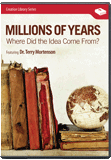
Understanding Genesis 1 Hebrew: Create (bara) & Make (asah)
Did God Create (Bara) or Make (Asah) in Genesis 1?
Abstract
Many people who have written on Genesis 1 have attempted to make a very significant distinction between two Hebrew words found there.
Keywords: create, bara, make, asah, theistic evolutionists, old-earth creationists, neo-Darwinism, exegesis, Hebrew, Genesis
Many people who have written on Genesis 1 have attempted to make a very significant distinction between two Hebrew words found there: bara (בָּרָא, to create) and asah (עָשָׂה, to make or do). Theistic evolutionists (TEs) and old-earth creationists (OECs) both accept the millions of years advocated by the scientific establishment (although the OECs do not accept neo-Darwinian evolution while TEs do). They sometimes try to defend the acceptance of millions of years by saying that bara refers to supernatural creation ex nihilo (Latin for “out of nothing”) but that asah means to make out of pre-existing material and therefore allows for creation over a long period of time. Such people say that the only supernatural creation events were in relation to the heavens and the earth (Gen. 1:1), sea creatures and birds (1:21), and Adam and Eve (1:27). Since asah is used for all other creative acts in Genesis 1, those acts could have been creative processes over the course of millions of years.
But this argument will not stand when we look carefully at the use of these words in Genesis 1 and in other biblical passages related to creation. Compare these two lists:
| Bara: to shape or create | Asah: to do or make | ||||
|---|---|---|---|---|---|
| Gen. 1:1 | created the heavens and earth | Gen. 1:7 | made the expanse between the waters above and below | ||
| Gen. 1:21 | x1 | created the sea creatures and birds | Gen. 1:16 | **;x2 | made the sun, moon and stars |
| Gen. 1:27 | **;x3 | created man (both Adam and Eve) | Gen. 1:25 | made all land creatures | |
| Gen. 2:3 | ** | created and made all His works | Gen. 1:31 | all that He made | |
| Gen. 2:4 | created heavens and earth | Gen. 2:3 | ** | all His works which God created and made | |
| Gen. 5:1 | ** | created man (both Adam and Eve, cf. 5:2) | Gen. 2:4 | ** | made heaven and earth |
| Gen. 5:2 | created male and female | Gen. 3:1 | made the beasts of the field | ||
| Ps. 89:47 | created all the sons of men | Gen. 3:7 | made loin clothes from fig leaves | ||
| Ps. 104:30 | x1 | created sea creatures | Gen. 3:21 | made garments from animal skins | |
| Ps. 148:5 | **;x2 | created heavens, heights, angels, hosts, sun, moon, and stars | Gen. 5:1 | ** | made man (referring to both male and female) |
| Isa. 40:26 | **;x2 | created stars | Gen. 6:6 | ** | made man |
| Isa. 40:26 | created trees, rivers | Gen. 7:4 | ** | destroy every living thing that I have made | |
| Isa. 54:16 | created the blacksmith and the destroyer | Gen. 9:6 | ** | man made in the image of God | |
| Ps. 121:2 | ** | made the heavens and the earth | |||
| Ps. 104:24 | **;x1 | made the sea, sea creatures, and land animals | |||
| Isa. 41:20 | ** | done this, made the trees and rivers | |||
| Isa. 43:7 | ** | made, created, and formed man | |||
| Isa. 45:18 | ** | made, formed, established, and created the earth | |||
The question before us is whether God’s “creating activities” and “making activities” in Genesis 1 are categorically different kinds of events or processes. From these verses above we can note the following:
- Some verses above indicate that God both “created” (bara) and “made” (asah) something. So, for example, ** shows that Gen. 2:4 uses both bara and asah to refer to the origin of the heavens and the earth. Gen. 5:1 and Isa. 43:7 do the same with respect to the origin of man. In other cases (e.g., marked by x1, x2, or x3), one verse says that God created (bara) something and a different verse says God made (asah) that same thing. So, for example, x1 shows that Ps. 104:24 says God made (asah) sea creatures (referred to in 104:25) but that Gen. 1:21 and Ps. 104:30 (referring back to 104:25) say that God created (bara) sea creatures. And x2 shows that Ps. 148:5 and Isa. 40:26 say that God created (bara) the stars, but Gen. 1:16 says God made (asah) them. Similarly, x3 shows that Gen. 1:26 says God made (asah) man in the image of God, and 1:27 says he created (bara) man in the image of God. Clearly, bara (create) and asah (make) are used interchangeably in the Bible in reference to the creation of the following: the sun, moon, stars, sea creatures, trees, rivers, man, heavens, and earth.
- Bara does not always mean to create out of nothing. God created the first male and female humans (Gen. 5:2). But we know from Genesis 2:7 that God formed (יָצַר, yatsar) Adam from the dust of the earth and in Genesis 2:22 we are told that God fashioned (בָּנָה, banah) Eve from the rib of Adam.
So, making a strong distinction between bara and asah in Genesis 1–2 is as unjustified as making a distinction between “create” and “make” in English. It is true that in Scripture only God is the subject of the verb bara; men make (asah) things, but only God creates (bara). But God also makes (asah) things. The verbs alone cannot tell us how God created and how long He took to create.
No distinction can be made between these Greek words in reference to Creation week.
New Testament references confirm this understanding when describing the creative work of our Creator, Jesus Christ. For example, John 1:3 says that all things came into being (ἐγένετο, egeneto) by the Word of God, who is Jesus Christ (John 1:14). Colossians 1:16 says that all things were created (ἐκτίσθη, ektisthay) by and for Christ. Hebrews 1:2 says He made (ἐποίησεν, epoiaysen) the original creation by His Word (cf. Heb. 11:3). “Come into being,” “create,” and “made” in these passages are clearly referring to the same divine activities in Genesis 1 and 2. No distinction can be made between these Greek words in reference to Creation week. These Greek words in these texts are in the aorist tense. None of these words by themselves connote any specific time frame other than that, in these cases, they refer to completed past action. They cannot be interpreted to mean that the processes are still going on (which would require a different Greek verb tense—present tense). Therefore, they disallow an evolutionary meaning, since evolution is said to be a process that is continuing today.
Conclusion
This short study shows that there is no basis for saying that bara only means an instantaneous, out-of-nothing, supernatural creative action but that asah only means a slow, out-of-existing-material, natural process of making (under God’s providence, of course). In the creation account (Genesis 1:1-2:3), both words are used in reference to ex nihilo creation events, and both are also used in reference to things God made from previously created material.
So, only the context in which the words are used can give the precise meaning, if there is a distinction to be made. The context of Genesis, indeed the whole Bible, is overwhelmingly in favor of interpreting both bara and asah in Genesis 1 as virtually instantaneous acts. Whether God created something out of nothing or created something from material that He had just made, the force of the words in context is that both kinds of activities were instantaneous and supernatural after God spoke “Let there be . . . .” In Genesis 1 and 2, we should assume ex nihilo (out of nothing) creation unless the text clearly indicates otherwise (e.g., Genesis 2:7, 22).
Recommended Resources

Answers in Genesis is an apologetics ministry, dedicated to helping Christians defend their faith and proclaim the good news of Jesus Christ.
- Customer Service 800.778.3390
- Available Monday–Friday | 9 AM–5 PM ET
- © 2025 Answers in Genesis


